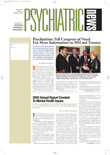Americans are still suffering psychologically from the terrorist attacks on the World Trade Center and the Pentagon, a survey conducted by the University of Michigan’s Institute for Social Research reveals. However, the attacks may have led to an increased sense of cohesiveness among Americans.
The survey results are based on a national telephone sample of randomly selected adults 18 years or older in 668 sample households. Interviewing was conducted from September 15 through October 7. The response rate was 59 percent.
More than 90 percent of those surveyed agree or strongly agree that they are proud to be an American, and nearly 60 percent agree that the world would be a better place if people from other countries were more like Americans. These are higher levels of patriotic feelings than reported in other national surveys during the past five years.
At the same time, the public has changed its attitudes toward the diverse groups that make up the country, with a greater tendency to view Americans of different races, ethnicities, and religions more favorably than in the past. Black Americans were rated positively by 67 percent of respondents, compared with 63 percent of people surveyed in 2000. Hispanic Americans were rated positively by 64 percent of respondents, compared with 58 percent in 2000. Asian Americans were rated positively by 62 percent of respondents, compared with 61 percent in 2000. Jewish Americans received positive ratings from 67 percent of those surveyed (no 2000 figure was available).
Seventy-eight percent of respondents rated white Americans positively in the wake of the terrorist attacks, compared with 72 percent in 2000 and 63 percent in 1998. Only Muslim Americans and Arab Americans did not fare as well; 43 percent of respondents rated these groups favorably.
The survey also found that Americans seem to believe that the terrorist attacks have many causes rather than a single explanation. “As a nation, we are not making the mistake of seizing on a single simple answer to a very complex question,” said University of Michigan psychologist Robert Kahn, Ph.D., in a press statement. “And that’s reassuring.”
In an open-ended question asking respondents to name possible reasons for the attacks, almost half provided at least two reasons, and 20 percent provided three or more. Among the most frequently mentioned were hatred of the United States, undesirable characteristics of the terrorists, religious issues, nonreligious differences between the United States and the terrorists, and U.S. international policies.
The survey results are posted on the Web at www.umich.edu/~newsinfo/Releases/2001/Oct01/r100901b.html. ▪
